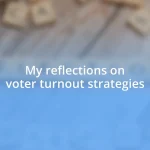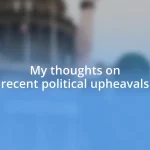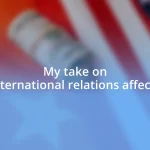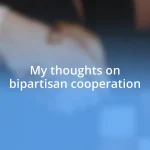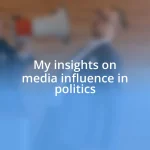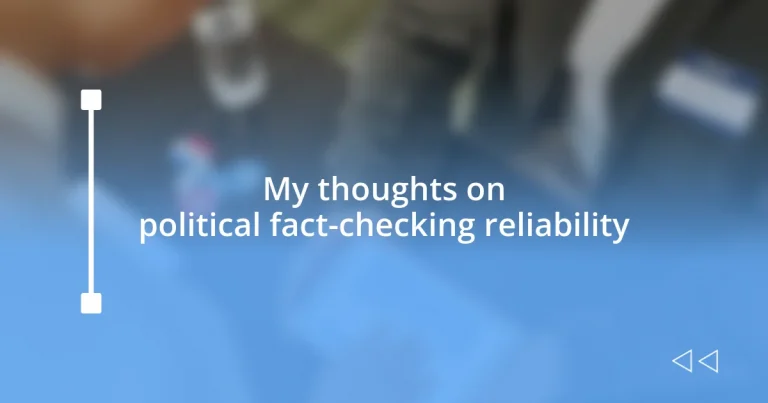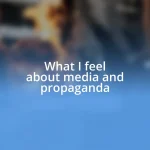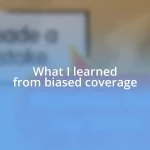Key takeaways:
- Political fact-checking is vital for verifying claims made by public figures, helping to combat misinformation and promote informed discussions.
- Reliability in fact-checking relies on transparency, track record, and expertise, underscoring the need to assess sources critically to avoid bias and misinformation.
- Effective fact-checking examples, such as real-time corrections during debates and rapid responses to viral misinformation, highlight the importance of trustworthy data in public discourse.
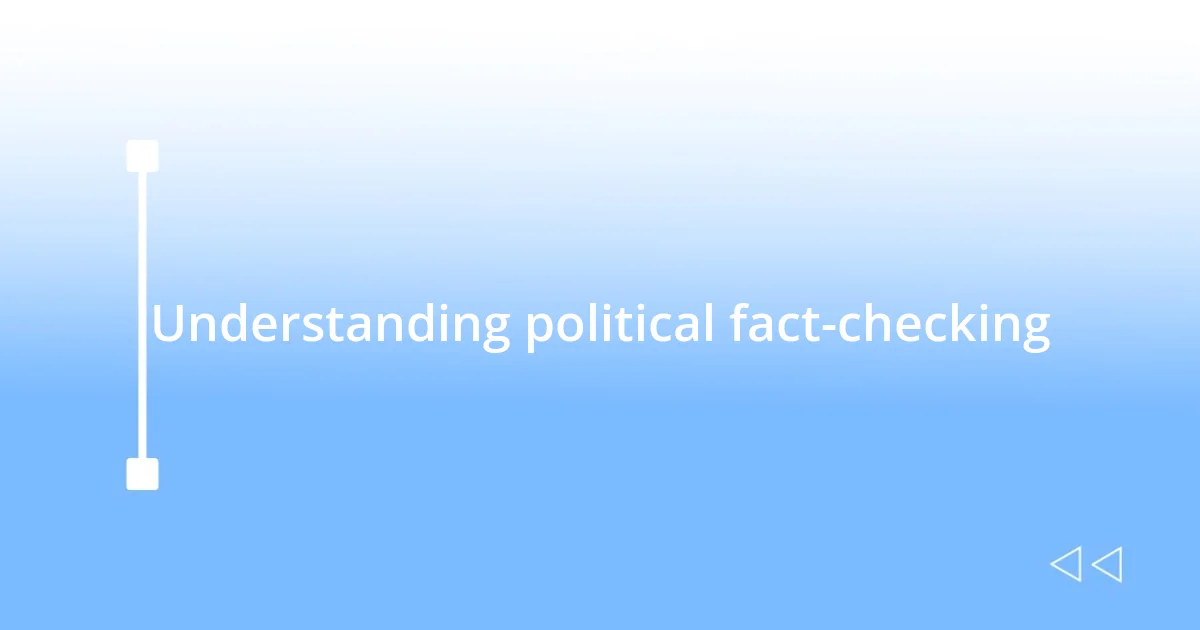
Understanding political fact-checking
Political fact-checking is a process that seeks to verify the accuracy of claims made by public figures, particularly in the realm of politics. I remember a time when a heated debate on social media turned into a frenzy of misinformation about a candidate. This experience made me realize how easily a false claim can spread, and how crucial it is to have reliable sources that can clarify or debunk these narratives.
When I delve into political fact-checking, I often wonder: how do we determine which sources are credible? Trustworthiness plays a vital role here. I’ve personally relied on established fact-checking organizations that adhere to strict methodologies. They not only evaluate the claim but also provide context, which is crucial for understanding the broader implications of what’s being said.
In my experience, the emotional impact of political discourse can skew our perceptions. It’s easy to cling to information that aligns with our beliefs, often blurring the line between fact and fiction. Engaging with fact-checking can sometimes feel like a stark awakening, forcing us to confront uncomfortable truths. This is why I believe understanding the nuances of fact-checking is imperative in today’s information landscape—it’s about making informed decisions rather than getting swept away by rhetoric.
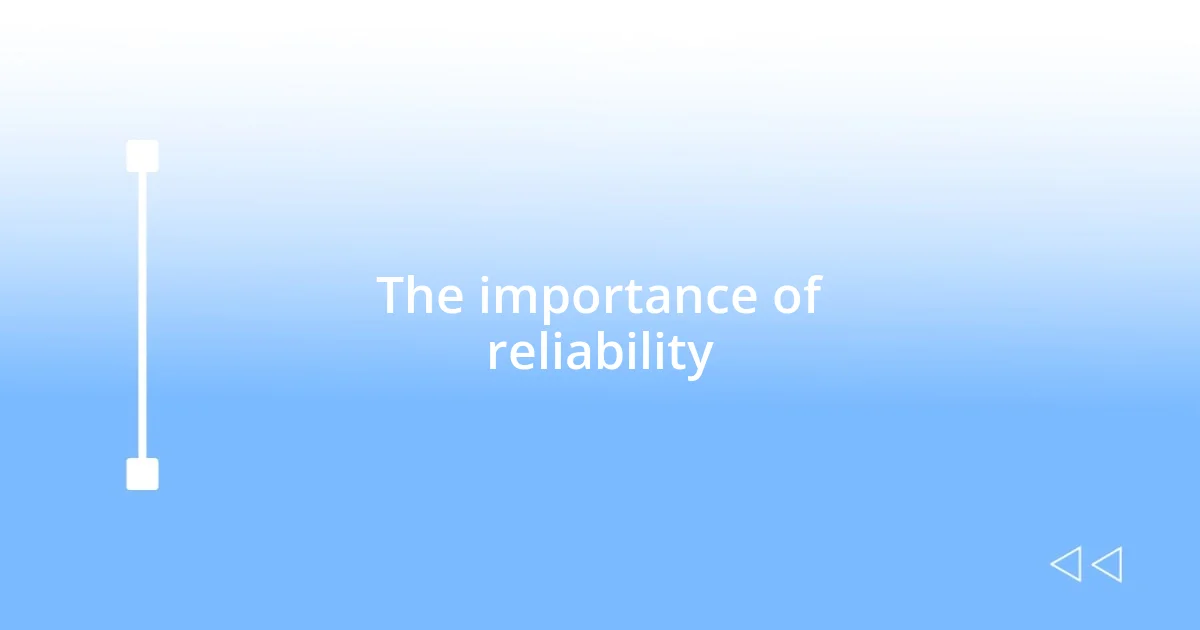
The importance of reliability
Reliability in political fact-checking cannot be overstated. When I first encountered a misleading claim during a political campaign, I felt a mix of anger and confusion. I wanted to act, to challenge the misinformation, but I quickly discovered that I needed reliable data to back my assertions. This experience underscored that without credible sources, our arguments become mere noise in the overwhelming sea of information.
Think about the implications of unverified information. I recall a friend sharing a viral post that exaggerated a politician’s stance on a crucial issue. The post stirred emotions, leading to heated discussions but lacked solid grounding. It was disheartening to see how easily misinformation could incite division without any reliability behind it. This moment stood out to me; it highlighted the acute need for information that we can trust.
In a world overflowing with data, the ability to discern reliable claims is like having a compass in a storm. Reflecting on my own journey, I recognize that seeking out well-researched fact-checking sites has equipped me to challenge misinformation head-on. Every time I share a verified truth, I feel a sense of empowerment, contributing to a more informed community. That’s the essence of reliability: it fosters informed conversations and promotes healthier discourse.
| Aspect | Reliable Sources |
|---|---|
| Verification Methodologies | Adherence to strict, transparent processes |
| Contextual Understanding | Provides wider implications and background of claims |
| Impact on Public Discourse | Encourages informed discussions and critical thinking |
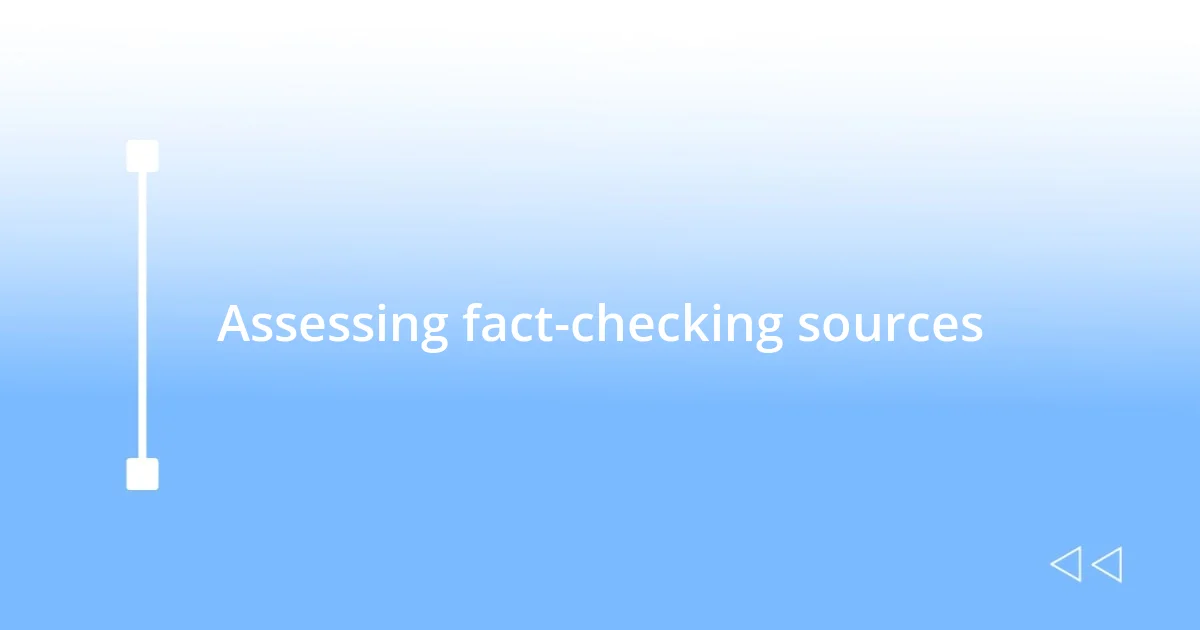
Assessing fact-checking sources
Assessing the credibility of fact-checking sources is essential in today’s politically charged environment. I’ve found that personal bias often influences our perception of what constitutes a reliable source. While reviewing claims, I came across a fact-check that initially seemed inconclusive to me. Yet, as I delved deeper into their methodology, I discovered that they followed precise protocols for verification, which reassured me of their commitment to accuracy.
When evaluating fact-checking sources, I consider the following criteria:
- Transparency: How open is the organization about its processes and funding?
- Track Record: What is their history of accuracy? Have they been known to make significant errors?
- Expertise: Do they have specialists in relevant fields reviewing the claims?
- Bias: Is there evidence of political or ideological bias in their work?
- Peer Recommendations: What do others in the journalism and research community say about them?
I remember a time when I was uncertain about a fact-checking site that was gaining popularity. After exploring their background and engaging with others who used their services, I felt more confident in using their findings. This process illustrated how a thorough assessment can transform uncertainty into trust, allowing me to advocate for the truth more effectively.
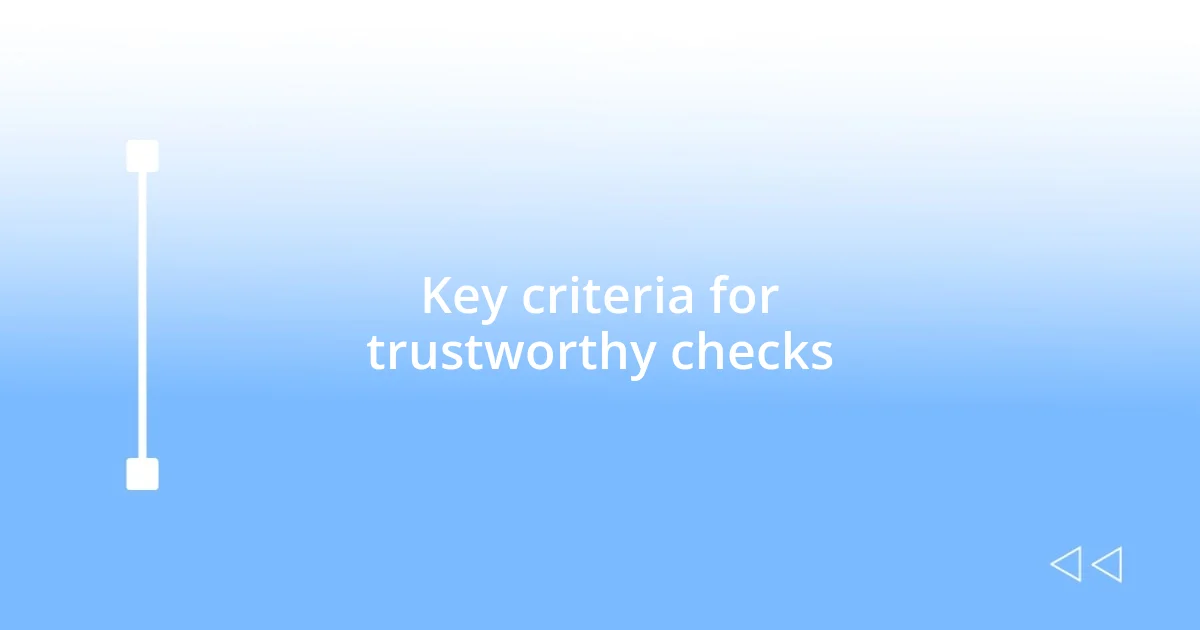
Key criteria for trustworthy checks
When I think about trustworthy checks, transparency stands out as a key criterion. I once stumbled upon a fact-checking website that seemed promising until I couldn’t find clear information about their funding or processes. This lack of transparency left me questioning their motives. Without insight into who supports them or how they verify information, how can I trust their findings?
Another critical aspect is the track record of the source. I remember a contentious debate about a policy where several fact-checkers provided conflicting information. I felt frustrated not knowing whom to believe. Ultimately, I researched their past performance and discovered that one source consistently validated claims accurately, while another was prone to errors. This experience reinforced my belief that a solid history of reliability is essential; it serves as a guiding light in the murky waters of political discourse.
Lastly, evaluating the expertise behind the claims is vital. I once encountered a claim debunked by a fact-checking organization that had social scientists specializing in political trends on their team. The depth of their analysis resonated with me, and it became clear that their background lent credibility to their conclusions. Isn’t it comforting to know that experts are behind the verification process? This reminder that specialized knowledge supports trustworthy checks keeps me grounded when navigating complex political narratives.
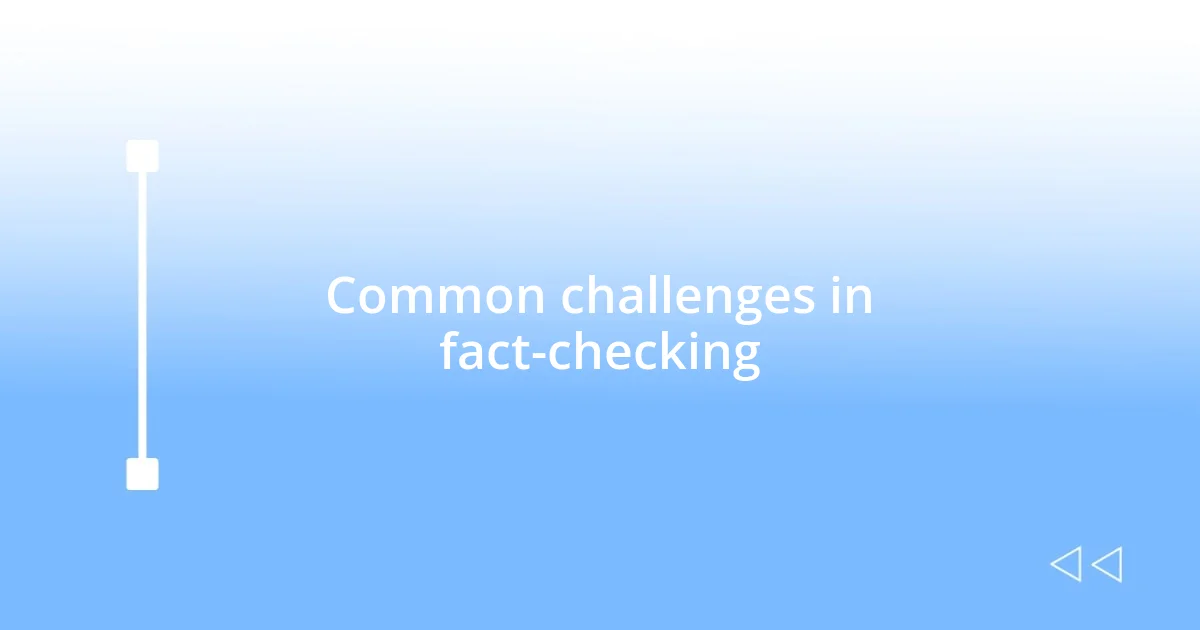
Common challenges in fact-checking
Navigating the complexities of fact-checking is no walk in the park. One challenge I often encounter is the sheer volume of information available. It can feel overwhelming, right? I remember scrolling through countless articles one evening, trying to determine which claims were valid. It struck me how easy it is to be misled, especially when different sources present conflicting conclusions. This experience highlighted that synthesizing information isn’t just about gathering facts—it’s about discerning which ones hold water.
Another common hurdle is the speed at which misinformation spreads. There’s this adrenaline rush when a sensational claim goes viral, and everyone seems to jump on it. I recall a heated discussion with friends about a trending topic that had multiple, sensational headlines. The urgency to share information often overshadows thorough verification, and I saw how quickly opinions were formed before the dust settled on the facts. This race against time can seriously undermine the reliability of what’s being reported.
Then there’s the issue of accessibility—how inclusive are these fact-checking platforms? I remember attempting to assess a particular fact-checking archive, only to find a maze of jargon that left me scratching my head. It dawned on me that if I struggle, what about others who might not have the same background or resources? This emphasizes a vital point: for fact-checking to be truly effective, it must be understandable and accessible to everyone. It’s a sobering reminder that the barrier to engagement can hinder informed discussions, leaving many still lost in the fog of misinformation.
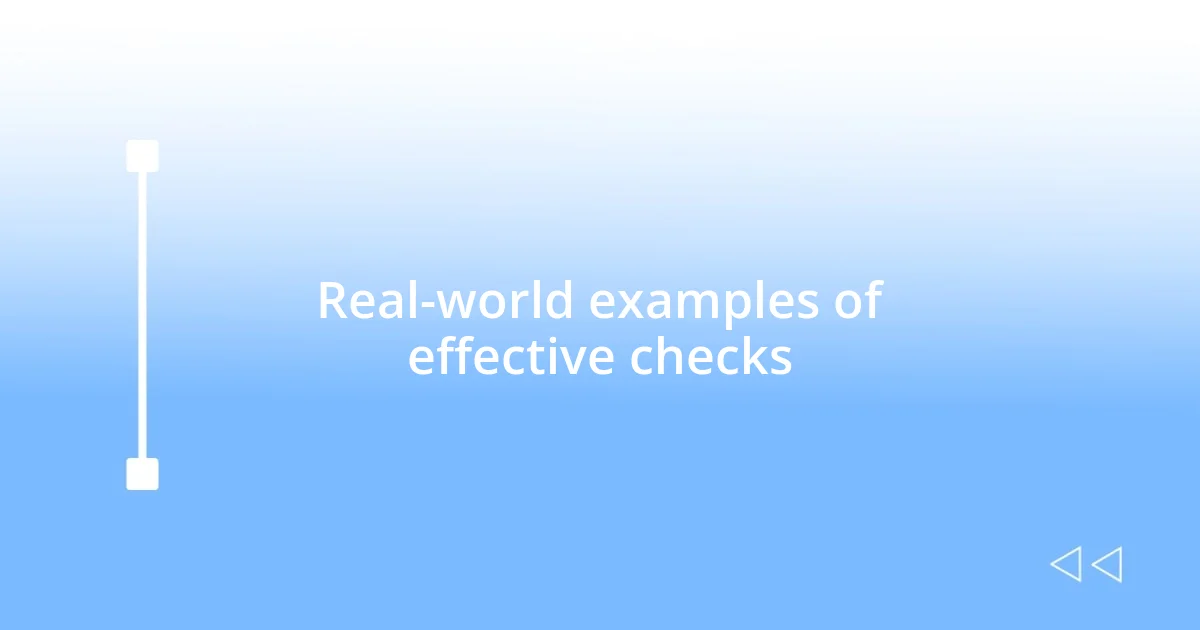
Real-world examples of effective checks
I often think about the impactful role that effective fact-checking has played in public discourse. A striking example for me was during the 2020 presidential election when major news outlets teamed up with independent fact-checkers. I vividly remember the real-time fact-checking that took place during debates. Viewers were instantly updated on claims made by candidates, allowing for immediate corrections. It was refreshing to see misinformation being challenged on such a prominent stage.
Another noteworthy instance was when a viral social media post claimed that a certain vaccine caused a serious health condition. I was surprised to see how quickly a network of fact-checkers was mobilized, referencing peer-reviewed studies and expert opinions within hours. As I followed their updates, it was comforting to know that those in the trenches of scientific research were behind the scenes, affirming that sound evidence could combat fear-based narratives. It raised the question in my mind: how crucial is it to have these checks in place to protect public health and trust?
Reflecting on my own encounters with fact-checking platforms, I remember using a website dedicated to debunking viral myths about climate change. Their thorough approach not only provided data but also relatable narratives from affected communities. I felt a sense of responsibility to share their findings with friends, fearing that misinformation could lead to a dangerous apathy toward climate issues. This experience made me realize that effective fact-checking isn’t just about numbers—it’s about weaving in human stories that resonate with people’s experiences and fears.
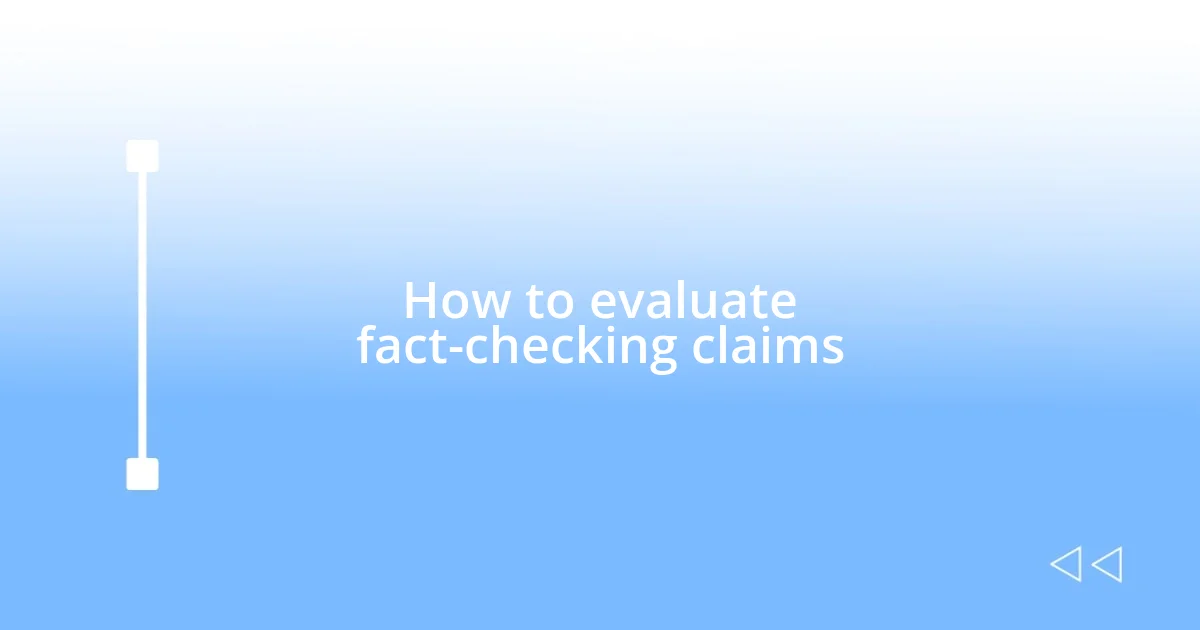
How to evaluate fact-checking claims
Evaluating fact-checking claims requires a discerning eye, especially when assessing the source. I often ask myself, “Is this organization transparent about its processes?” When I stumbled upon a fact-checking site that outlined its methodology clearly, it gave me a sense of trust. Transparency in methods not only builds credibility but also allows the audience to follow along with how conclusions were drawn.
Another crucial aspect is the context surrounding the claim. I recall analyzing a fact-check about a political statement that initially appeared misleading. However, after delving deeper, I recognized the statement’s context, which shifted my perspective entirely. It’s a reminder that without context, even well-verified facts can mislead. I believe it’s essential to look at the bigger picture and ask, “What was the intent behind the original statement?”
Finally, checking if the fact-checking source has references to credible evidence can significantly impact reliability. I remember reading a fact-check that cited a peer-reviewed journal, which made me feel more confident about its findings. But if I encounter claims devoid of reliable sources, I can’t help but feel skeptical. After all, isn’t it crucial that claims are backed by solid evidence? My approach is always to verify that the information is grounded in trustworthy documentation before forming my own conclusions.






